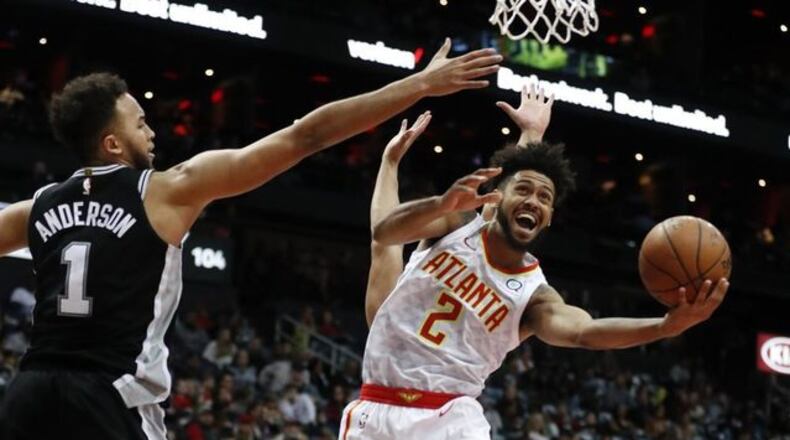Hawks guard Tyler Dorsey finished his rookie season on a high note. Soon after, Dorsey was at the team’s practice facility for near-daily work on the weaknesses that prevented his first NBA season from being better overall.
“Every aspect: my finishing (at the basket), spot-up 3’s, off the dribble 3’s, pull-ups,” Dorsey said. “I’m just a worker. I can’t stay out of the gym. That’s just what I love to do. I’m trying to get better. Summer league is taking a step into the next season.”
The Hawks selected Dorsey with the No. 41 pick in the 2017 draft after he starred for two seasons at Oregon. Dorsey was a 3-point specialist in college and outside shooting, plus defensive rebounding, were his main strengths as an NBA rookie.
That carried over into the Dorsey’s first two games at the Utah Summer League, when he shot 4-for-11 on 3-pointers and collected eight defensive rebounds in 56 minutes. Dorsey led all Hawks players with a total of 32 points in those two games.
Dorsey has a fully guaranteed contract for next season but could help his standing by improving his defense and becoming a true combo guard rather than just a spot-up shooter. The results were mixed in those areas in his first two games in Utah (with the caveat that the nature of summer league games makes them physical and sometimes disorderly).
In addition to improving his game, Dorsey is trying to learn the expectations of new coach Lloyd Pierce and find his niche within a new offensive system.
“I wouldn’t say I’m really comfortable yet,” Dorsey said. “I’m still learning. I’m trying to figure it out on the fly and learn the offense this summer and training camp. This is my second year, and I just wanted to come out and be aggressive and make the right reads.”
Dorsey finished his rookie season as part of then-coach Mike Budenholzer’s playing rotation after he logged a total of 51 minutes over the first 11 games. Injuries and trades opened minutes in the backcourt, and Dorsey returned from a G League stint to play in each of the final 45 games with averages of 20 minutes, 8.5 points, 2.7 rebounds and 1.7 assists.
Dorsey made 36.4 percent of his 185 3-point attempts during that span, but just 38.6 percent of his 176 2-point shots. For the season, Dorsey’s 39.3 percent shooting on 2-pointers was sixth-worst among 48 rookies who played at least 500 minutes.
There also could be a spot for Dorsey in Pierce’s rotation, especially if he can improve his defense and play-making. Isaiah Taylor and Malcolm Delaney, who both played off the bench as part of small backcourts, no longer are on the roster. Wings Antonius Cleveland and Jaylen Morris, who have non-guaranteed contracts for 2018-19, played limited minutes as rookies last season.
As a rookie Dorsey finished poorly at the rim and didn’t show much as a ballhandler in pick-and-rolls. Dorsey competed on defense, but like with his scoring around the basket, Dorsey will have to find ways to improve in that area despite his relatively small frame and short wingspan.
If Dorsey doesn’t get better, it likely won’t be because he didn’t put in the work. Dorsey immediately gained Pierce’s notice for his ubiquitous presence at the team facility this summer.
"I got hired on May 11, and Tyler has been here pretty much every day,” Pierce said. “Monday through Friday he's in the gym, and he’s consistently coming back at night to shoot.”
About the Author





